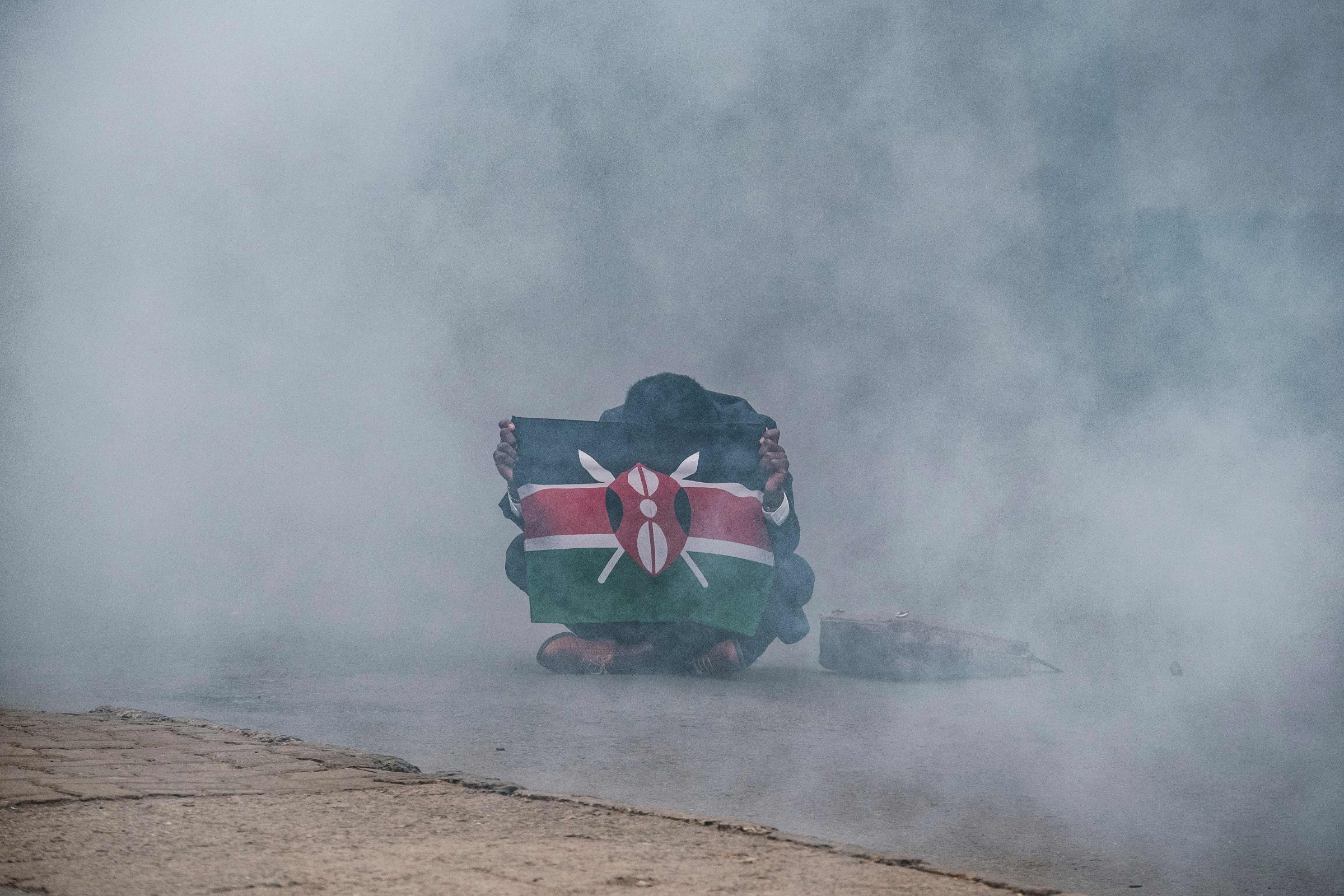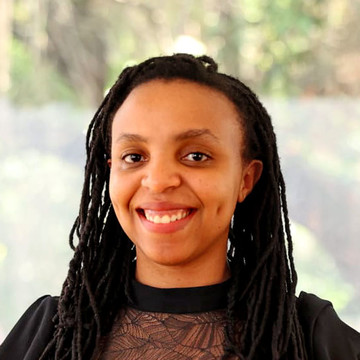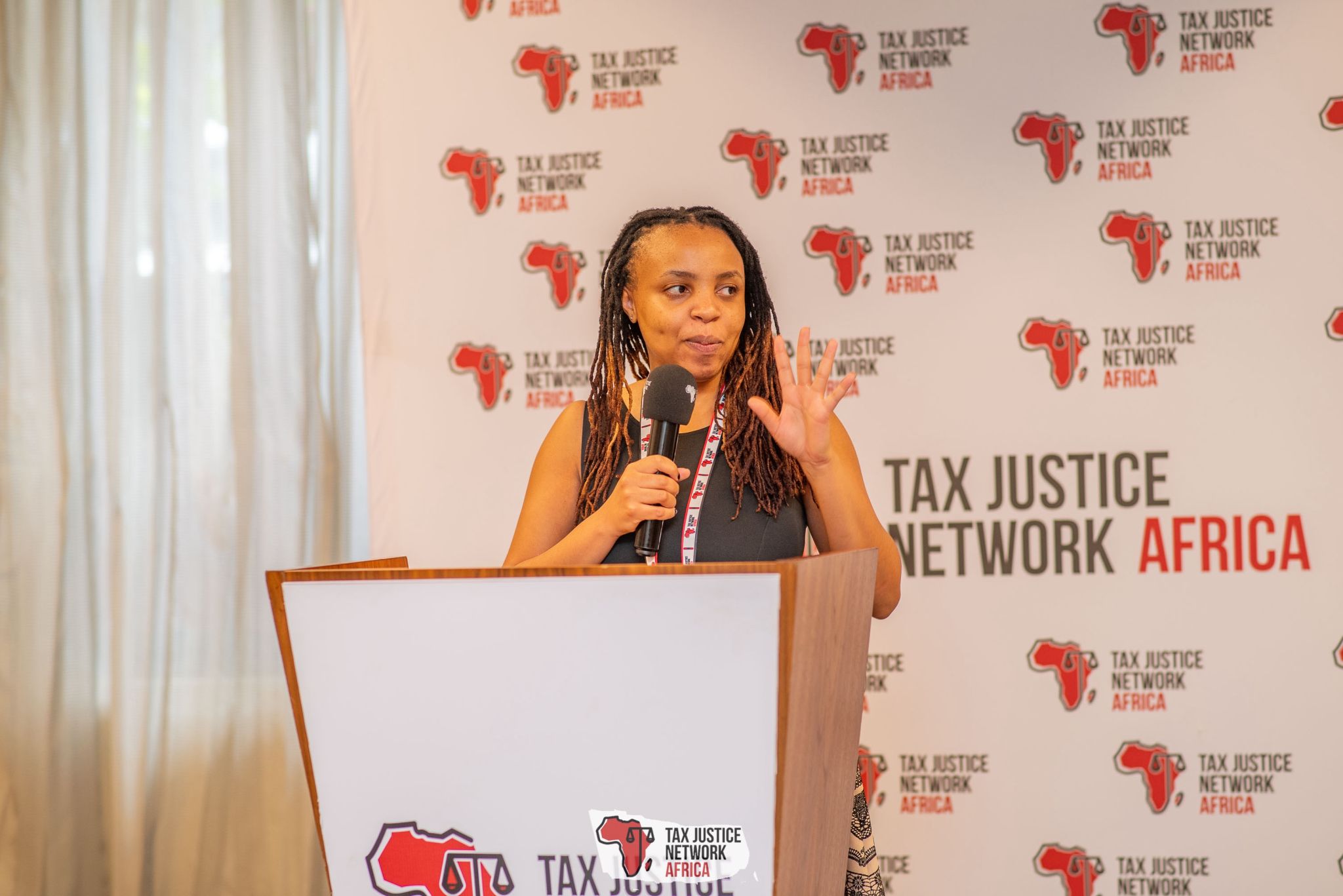Share post now

global
The Alliance Sud magazine analyses and comments on Switzerland's foreign and development policies. "global" is published four times a year (in german and french) and can be subscribed to free of charge.
International Tax Policy
29.11.2024, Finance and tax policy
Everlyn Muendo is following the UN negotiations for a framework convention for international cooperation in tax matters on behalf of the Tax Justice Network Africa (TJNA). In this interview, she analyses the current developments in the process in New York and explains why there is no longer any alternative to the UN for the Global South when it comes to international tax policy. Interview: Dominik Gross

Tax revenue is flowing to the north, the cost of living is rising: Violent protests against unjust fiscal policy reforms have been shaking Kenya since June. © Keystone / AFP / Kabir Dhanji
Alliance Sud: Everlyn Muendo, you participated in the negotiation sessions for a UN framework on international tax cooperation in New York this year. What is your general impression of this process so far?
We experienced a very clear and sharp political divide in terms of the positions between the Global North and the Global South. Overall, through all the sessions, we could clearly see what the positions of the Global North and of the Global South were.
The transparency of the negotiations is already a big step forward compared to those in previous years at the OECD in Paris. Where do you see the major issues resulting in this divide between North and South?
I would summarize the positions of the Global North into the following issues. Firstly, they think that the UN framework convention should play a complementary role to the OECD and shouldn’t – as they call it – duplicate its work in the field of international tax cooperation. So obviously the work of the OECD in this field. Secondly, their goal seems to be to diminish the role of the UN only to capacity building, which means to offer support in terms of infrastructure and expert education for tax administrations in the Global South. This is the result of a profound misperception of the situation of the Global South: They seem to think that we don’t have adequate capacities. In their view this is the reason for the international tax system not being inclusive or effective. This is a disingenuous argument, because even during the inclusive framework process of the OECD some developing countries articulated substantive and significant concerns about the overall direction of the global minimum tax and the redistribution of taxing rights to market countries. But those concerns were constantly ignored.
In the UN framework convention process, the countries of the Global South are strongly pushing to address the systemic issues.
How were these concerns ignored?
For instance, developing countries were obviously not comfortable with setting the minimum tax rate to fifteen percent. We wanted a much higher rate. But we still ended up there. Some countries went as far as rejecting the so called Two Pillar Solution of the OECD back in 2021. These were Nigeria, Kenya, Sri Lanka and Pakistan. But still, nothing was substantially done to change the way these proposals were framed. That’s why I think it is very disingenuous to say it is a capacity issue. It is the substantive rule making that needs to be changed. As I said in my statement during the negotiations in April in New York, you can’t capacity build us out of imbalanced taxing rights. In the UN framework convention process, the countries of the Global South are strongly pushing to address those systemic issues.
So, countries of the Global North are trying to avoid the crucial issues in this process?
Yes, I think so. My impression is that they are not negotiating honestly. But in international negotiations it is a fundamental principle that both parties are supposed to negotiate in good faith. They are also obligated to implement the treaties and the obligations that they have agreed on in good faith. For instance, to say that we need more technical analyses, does not build confidence. We have the UN secretary general’s tax report on the status of international tax cooperation, which was particularly looking at how the lack of inclusiveness in international tax cooperation is making international tax cooperation ineffective. So, we have proof of our arguments, it’s all there.
How is the coordination between African countries working?
I think the Africa Group is doing its best with the limited resources that are available, both on the human and the technical level. I think we also have seen a lot of great leadership from the African Union commission and the Pan African bodies – the UNECA (UN Economic Commission for Africa) and the ATAF (African Tax Administration Forum) – in organizing and informing African countries of what is at stake at the UN.

Everlyn Muendo
Kenyan Everlyn Muendo is a lawyer at the Tax Justice Network Africa (TJNA). She works on the question of how international tax policy influences development financing in African countries.
How can we as a global civil society coalition best challenge the position of the EU or Switzerland speaking off “duplication” and “capacity building”?
First, it just needs to be acknowledged, that the OECD initiatives and processes such as the development of the automatic exchange of information or the one of the minimum tax for multinationals are not working for a significant group of people, particularly in countries of the Global South. That’s why they are seeking to create another forum for international tax cooperation which should be inclusive. This is clearly defined in the UN resolutions on which the process has been based since 2022. Secondly, there is no other universal initiative on global tax cooperation. Some may say we could regard most of the work which has been done at the OECD as regional level work. The question is then what would be the criteria for picking and leaving certain aspects of what has been done. For example, Pillar 1 of the OECD BEPS II project which is supposed to be about reallocation of taxing rights will probably never be completed. These aren’t issues which we can give more time to.
Countries agreed on the Terms of Reference of the convention with a 2/3 majority. What is at stake now?
Tax is such a critical issue when it comes to financing for development. It is not just about technical issues like profit allocation rules or the division of taxing rights. It is about building up decent education systems for all or about fighting the public health crisis in the Global South. The reason for the dramatic problems in both fields is a constant underfunding of public services in those countries. At the end it’s about human beings. Our inaction brings about victims and that’s why we really want to move forward with this process. It is also about generating resources to finance climate protection. Although we – compared to the Global North – contributed very little to the climate crisis, we are severely affected by it.
On the African continent you can’t speak about international taxation without speaking about taxation of natural resources, particularly those of the extractive sector.
What would be the key solutions for resource-rich countries in Africa?
On the African continent you can’t speak about international taxation without speaking about taxation of natural resources, particularly those of the extractive sector. Most multinational enterprises within the continent are part of the extractive industry. But their headquarters are obviously in developed countries. It’s actually a very complicated issue and goes way back into our colonial history. Before colonialists left, they made sure that even after independence our economies would be structured in a way that benefits them the most. So, instead of building up food security for instance, our economies have been structured in such a way that we would essentially continue to produce coffee, tea, crops and commodities that are of most value to developed countries. Essentially, we export all these raw materials, and the added value is made outside the continent. On the other side all the final products resulting from industrial production in the Global North based on our raw materials are then sold back to us. We don’t gain as much as we should from our own resources in comparison to countries who don’t have these commodities at all.
Can you give us an example?
Which country is known for good chocolate? It’s not Ghana.
Switzerland?
Exactly! This is a striking fact if you consider that over half of the cocoa beans imported into Switzerland comes from Ghana. Because of harmful tax practices and aggressive tax planning by multinationals hundreds of billions of dollars in profits are shifted away from African countries. Even with the economic activities which foreign companies are carrying out and the income they’re generating through our resources we don’t get our fair share of taxes. Instead, the tax revenues go primarily to the residence countries of the multinationals. The system is really set up against us.
It will take some time until new UN rules based on a future framework convention will bear fruit. Are there current opportunities for improvement outside this process?
We are also fighting for more bilateral double tax treaties based on the UN model rules which are much better than their counterparts at the OECD, but we haven’t been so successful with that. By nature, a single country from the Global North has a lot of power when it comes to negotiating a bilateral agreement. And some of those countries are bullies! The imbalance of economic power really plays out here. So even if African or developing countries in general do have a lot of capacity, they still end up giving away a lot of our taxing rights. That is happening because we feel the pressure that we still must attract foreign direct investment from a partner country to fuel economic development. I like to call that the FDI fallacy in Africa.

Everlyn Muendo at a discussion of the Tax Justice Network Africa on tax and climate justice this November in Nairobi. © TJNA
The Kenyan society faces huge tensions because of a recent new finance bill issued by the national government. Can you explain what is happening there?
The June 2025 Finance Bill protests were bigger than the Finance Bill itself. They were an expression of the frustration of hardworking Kenyans with the increasing economic injustices. The Kenyan government is highly indebted and desperately needs to raise resources for debt servicing and development. But it is introducing taxes that have a heavy bearing on the cost of living. These include a proposed eco-levy, a motor vehicle tax, increased road maintenance levies and removing VAT exemptions on certain crucial items, amongst others. These taxes are highly regressive yet at the same time, we receive very little value for our money in terms of public services. The bulk of the revenue is spent on debt servicing, which can take up more than 50% of the revenue, and on corruption which crowds out critical public services.
What are the consequences?
There is a breakdown of public services such as health and education. For instance, there have been severe pay cuts for public servants such as medical interns whose salaries were reduced. Additionally, a new university funding model was introduced. This model skyrocketed university fees leading to a huge public outcry. Kenya has become a hub for experimentation on fiscal consolidation measures. Ordinary Kenyans are losing twice!
How can you – as Switzerland - talk about corruption in the African continent, while you are the biggest enabler of secrecy perpetrating illicit financial flows?
What do you say to the accusation, that more public revenue in African countries would disappear due to corruption anyway?
How can you – as Switzerland - talk about corruption in the African continent, while you are the biggest enabler of secrecy perpetrating illicit financial flows? Seriously, all I can say, it needs two to tango. On the one hand there is an African official who is corrupt, but who is giving him the bribe? A lot of corporations! We had Glencore from Switzerland. The corruption cases this corporation has been involved in are very telling. We also must recognize the role secrecy jurisdictions like Switzerland have played in this by being a haven for these corrupt individuals and officials in our countries. That’s why a lot of this wealth is held offshore. Nobody says, oh I am going to hide my money in Kenya. No! It’s Switzerland! You are infamous for a reason!
How is all this related to tax avoidance of multinationals?
Aggressive tax planning and corruption are the same. They are both immoral, they both have the same overall effect of bleeding out resources. But one is legal, one is not. And this is why you find a lot of African countries that prefer using the term illicit financial flows (IFFs), where we are grouping all these activities together and trying to produce a continental level strategy to address it – whether they are legitimated by law or not. Particularly the commission of the African Union is doing a lot in this regard with the support of the UN.
Let us get back to the UN. The next negotiations are due in February 2025. Could the positions of the Global North change?
Well, there are two interesting developments in this regard: Firstly, the EU states abstained in the vote on the key elements of the convention in August instead of voting no, as they did on the previous resolutions. This is a sign that the Global North's extraordinarily strong skepticism towards the process itself is easing. That could have a positive impact on the next rounds of negotiations. Secondly, Donald Trump's victory in the US presidential elections could lead to the USA completely blocking both OECD and UN processes. Up to now, the countries of the North have always said that decisions at the UN need to be made by consensus. However, I think that they will now have to adjust this position in view of the developments in the USA.
Going to the UN is our way of addressing fundamental challenges.
What would you like to change?
Wouldn't it be better to be satisfied with simple majority decisions, even if consensus is the ideal? Sometimes things just do not go according to your own ideal. Instead of being held back by a single country or a small group of countries, it would be more democratic to allow everyone else – whether from the Global North or the Global South – to move forward. However, if decisions are made by consensus, the USA, as the economically strongest country, has a virtual veto power. It would be much more democratic to give every country an equal vote in majority decisions.
Where do you see positive developments on the African continent?
In several African countries we see a political process today, in which people push for stronger accountability systems of our own leaders, politically and economically. Especially in West Africa, for example in Senegal. The uprisings we have recently experienced there showed to a certain extent also an extreme expression of the desire for self-determination in societies which we can still call postcolonial. No matter if you look from trade to debt to tax to whatever: we may have political sovereignty, we may be recognized states by international law, but we are far from economic sovereignty. Going to the UN is our way of addressing those fundamental challenges because tax sovereignty is a very crucial part of economic sovereignty overall.
Share post now

global
The Alliance Sud magazine analyses and comments on Switzerland's foreign and development policies. "global" is published four times a year (in german and french) and can be subscribed to free of charge.